Quality assurance (QA) isn’t just about testing separate pieces of software code. It’s about building a product that matches your expectations, meets end users’ needs, and is reliable, secure, and stable all at the same time.
But when and how exactly should you engage QA experts in your project? Why is QA important in software development? Is it really necessary to consult QA specialists during the stages of software development that aren’t directly related to software testing? In this article, we answer these questions, discuss the importance of QA in software development, and analyze the main benefits of close cooperation with QA specialists throughout different stages of the software development life cycle (SDLC).
Contents:
The importance of quality assurance
Quality assurance is a complex process that includes multiple steps united by the same goal: to ensure the security and quality of the software under development. When professionally organized and executed, QA enables you to find and eliminate possible security and performance issues before the product is released.
QA is often mentioned alongside two other terms:
- Quality control
- Software testing
While they might sound similar, these terms have different meanings and address different problems. For example, in contrast to quality control, QA is proactive and aims to identify and avoid possible issues before they even occur.
QA shouldn’t be confused with software testing either, as the latter is basically a tool meant to detect software defects and check if they were successfully fixed.
Neglecting certain QA activities may create the illusion of faster feature delivery or reduced project costs. However, in the long run, not paying enough attention to quality assurance processes leads to dangerous risks, both technical and commercial:
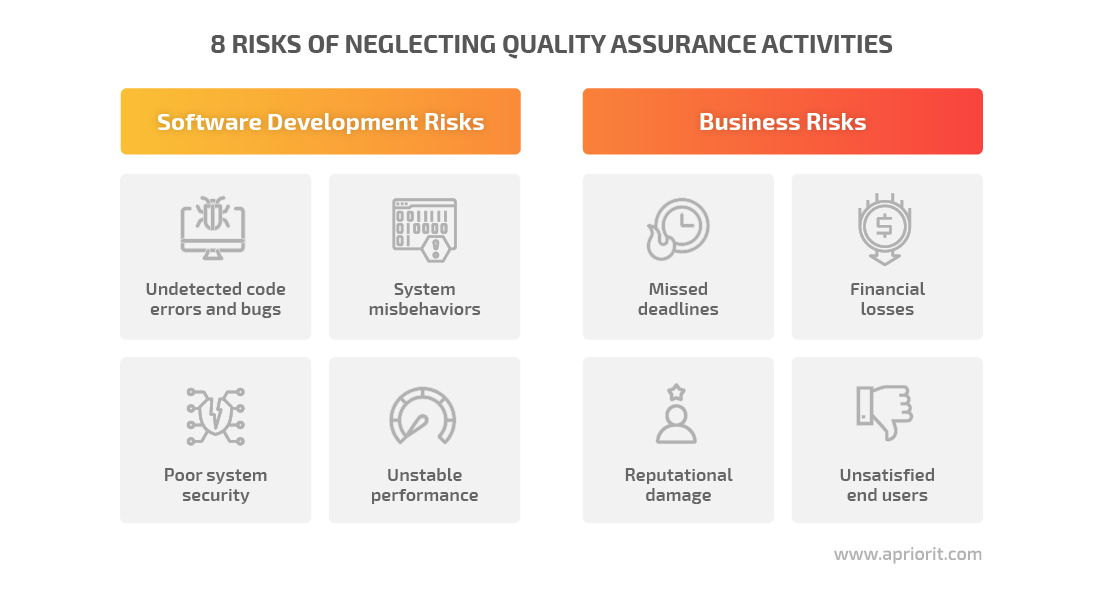
In turn, proper implementation of quality assurance in software development is associated with multiple benefits, including:
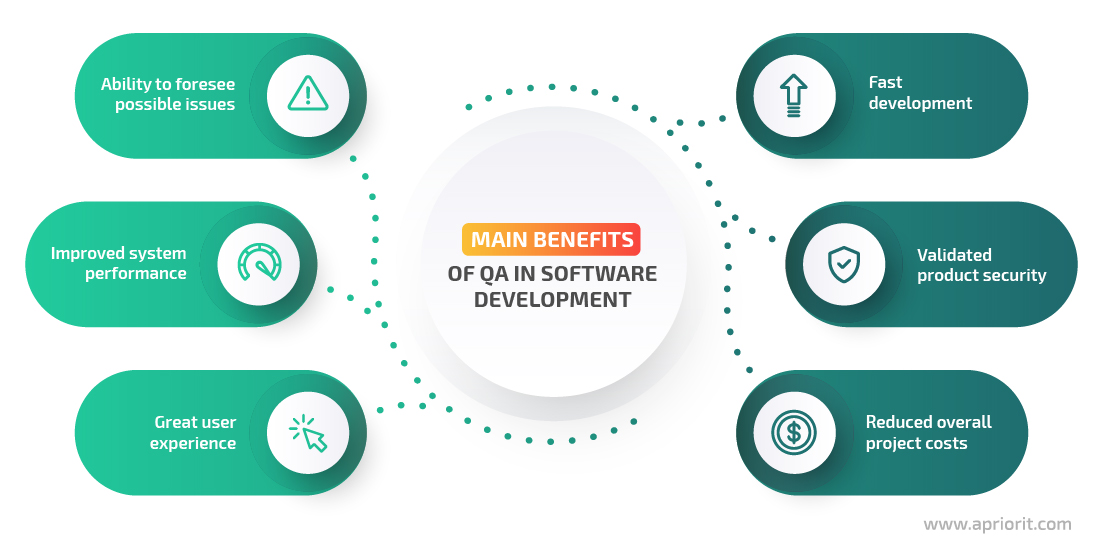
The most important thing is to make quality assurance an essential part of the overall software development lifecycle — not only the software testing stage.
In the next section, we discuss the role of QA in software development, describe Apriorit’s approach to software testing and explain how our QA professionals help our clients build better and more secure products.
Why and when to involve QAs in software development
Even when implemented as a traditional stage of the SDLC, quality assurance can provide a project with a number of valuable benefits. However, if you decide to leverage quality assurance throughout the entire software development life cycle, you can experience even more impressive and valuable benefits.
Here are the six key stages at which we at Apriorit prefer to team up with QA engineers as well as the main benefits of this cooperation.
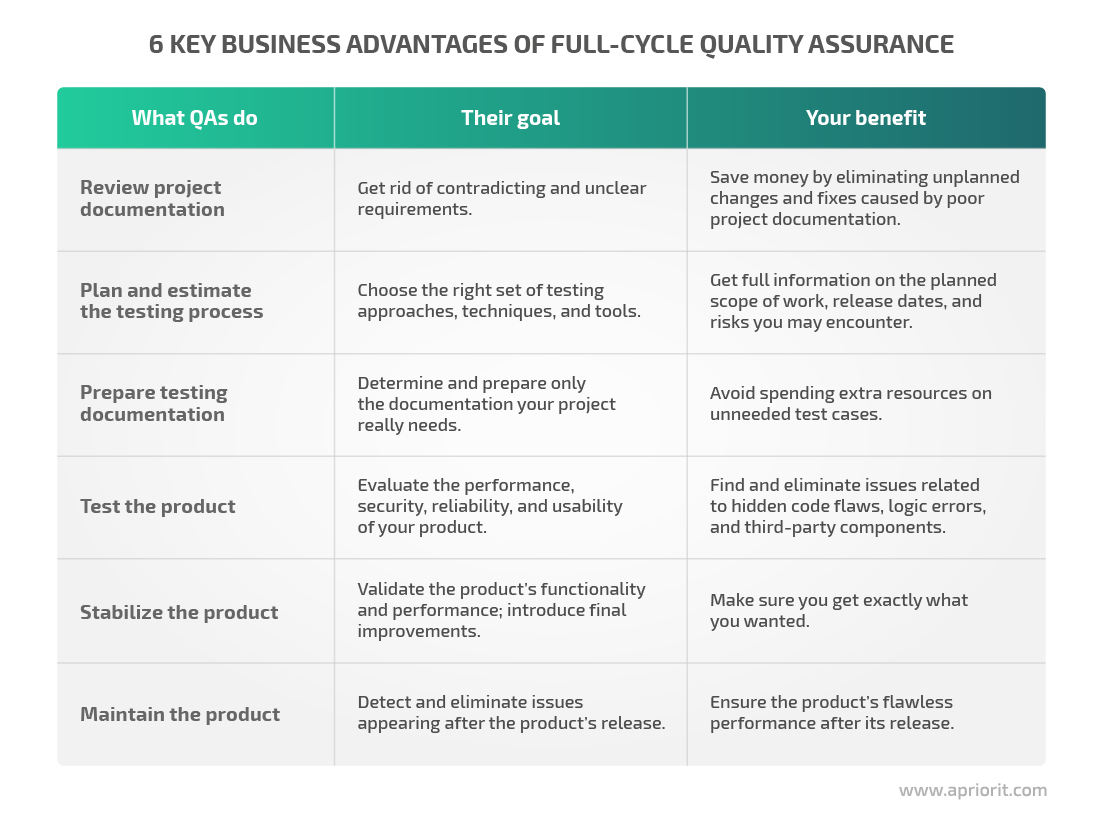
As you can see, by engaging QA engineers from the very beginning of development, all project stakeholders can ensure the creation of a quality, reliable, and secure product. Now, let’s see in detail how to set up QA processes in a development company and what QA activities to include at each of these six stages.
Read also:
Ensuring Proper VoIP Call Quality of Your Audio/Video Conferencing Solution: Tips and Tricks
1. Project documentation review
Apriorit’s quality assurance professionals get involved in the project at early stages, usually starting with reviewing project documentation and requirements. By doing so, they achieve several goals:
- Get familiar with initial product requirements
- Detect potential contradictions in goals
- Eliminate inaccuracies in product specifications
- Complete and finalize product requirements
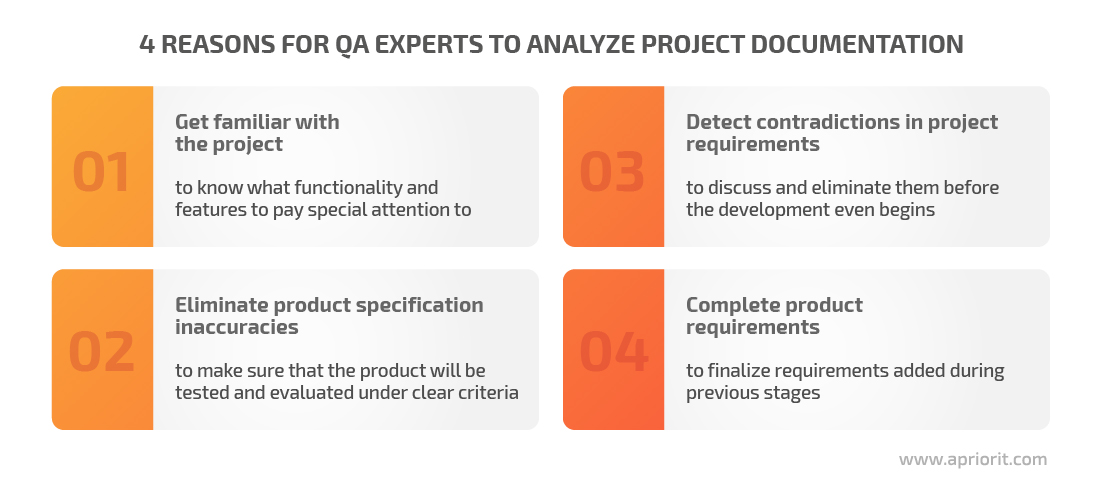
If you don’t engage QA experts in reviewing software requirements documentation, you might need to adjust the requirements and specifications for your product when it’s already in development. And in this case, you risk spending more time and money. Not to mention that when guided by inaccurate and incomplete specifications, you are likely to get results that don’t match your expectations.
For instance, we had several projects where consulting a QA specialist when finalizing project requirements allowed our team to determine critical inaccuracies in specifications. If left unaddressed, these inaccuracies could have delayed product delivery or negatively affected key functionality.
2. Planning and estimation of the testing process
Apriorit’s QA engineers pay special attention to creating testing strategies and testing plans for each project they work on. When planning testing activities, they focus on:
- Preparing a test plan
- Determining a test strategy
- Estimating QA activities
- Preparing a testing schedule
- Assessing risks
- Selecting testing tools
The choices QAs make while planning the testing strategy can affect the quality, reliability, security, and even cost-efficiency of the entire project.
For instance, one of our clients had a ready product that required extra spending on customer support. As product maintenance was delegated to Apriorit, our QAs analyzed the problems commonly reported by end users. We selected relevant testing tools and built a testing strategy that took into account all the weaknesses and peculiarities of the client’s system. Once implemented, the new testing approach helped our client reduce customer support time by nearly 60%.
As part of the planning process, our QAs estimate the time needed for testing activities within a particular project. We aim to provide our clients with clear estimates showing which testing activities will be conducted, the planned completion dates, what risks we may encounter along the way, and so on.

At the same time, we always aim to create a testing strategy that precisely reflects the needs of a particular project, and only when such a strategy or testing plan is really needed. When designing a testing plan or a strategy brings no benefits to the project, we omit this activity.
Apriorit QA specialists also participate in intermediate planning sessions for future releases, sprints, or iterations. Thanks to their deep product knowledge, our QAs can explain how particular functionality works or provide valuable insights on possible product improvements.
3. Preparation of test documentation
When designed properly, test documentation can help you accomplish all sorts of tasks:
- Introduce new specialists to the project
- Evaluate team efficiency
- Report on completed tests and detected bugs
- Implement process automation
- And more
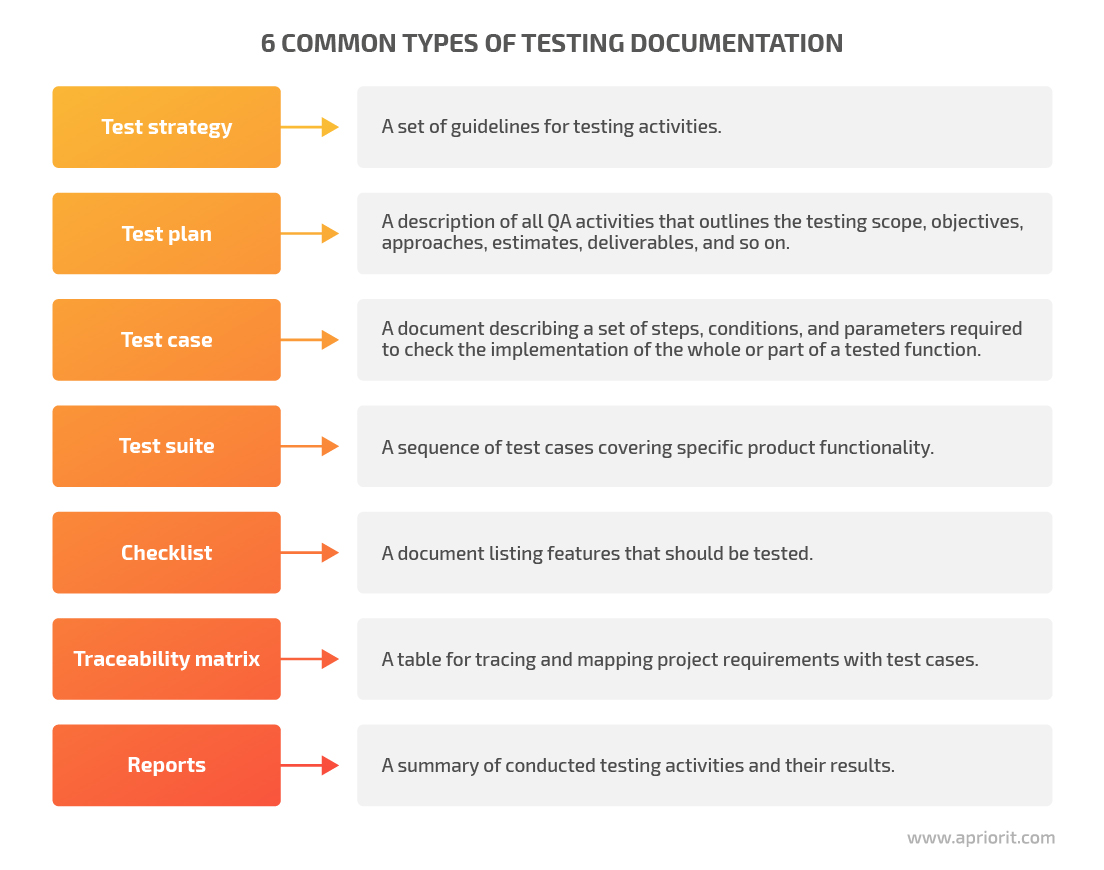
When deciding what test documentation to work with, Apriorit QAs look for the perfect balance between client suggestions and the needs of the project at hand. At this stage, it’s crucial to decide which types of test documentation to use and which to exclude. Fail to make the right choice and you risk overspending your time and money on writing extensive test cases or leaving critical bugs undetected.
Test documentation is also a significant part of the in-team knowledge sharing process. One of our clients had to spend extra time and money restoring information on system behavior and core product features after the sudden resignation of a key specialist. Having all this data properly documented from the beginning of the project would have saved our client lots of resources and made it easier for new team members to get on board fast.
4. Product testing
To ensure successful product testing, a QA specialist should take into account:
- The type of product under test
- Technologies used
- Core functionality
- Potential weaknesses
- And more
Depending on these specifics, QA professionals choose relevant testing approaches and use different types of functional and non-functional testing.
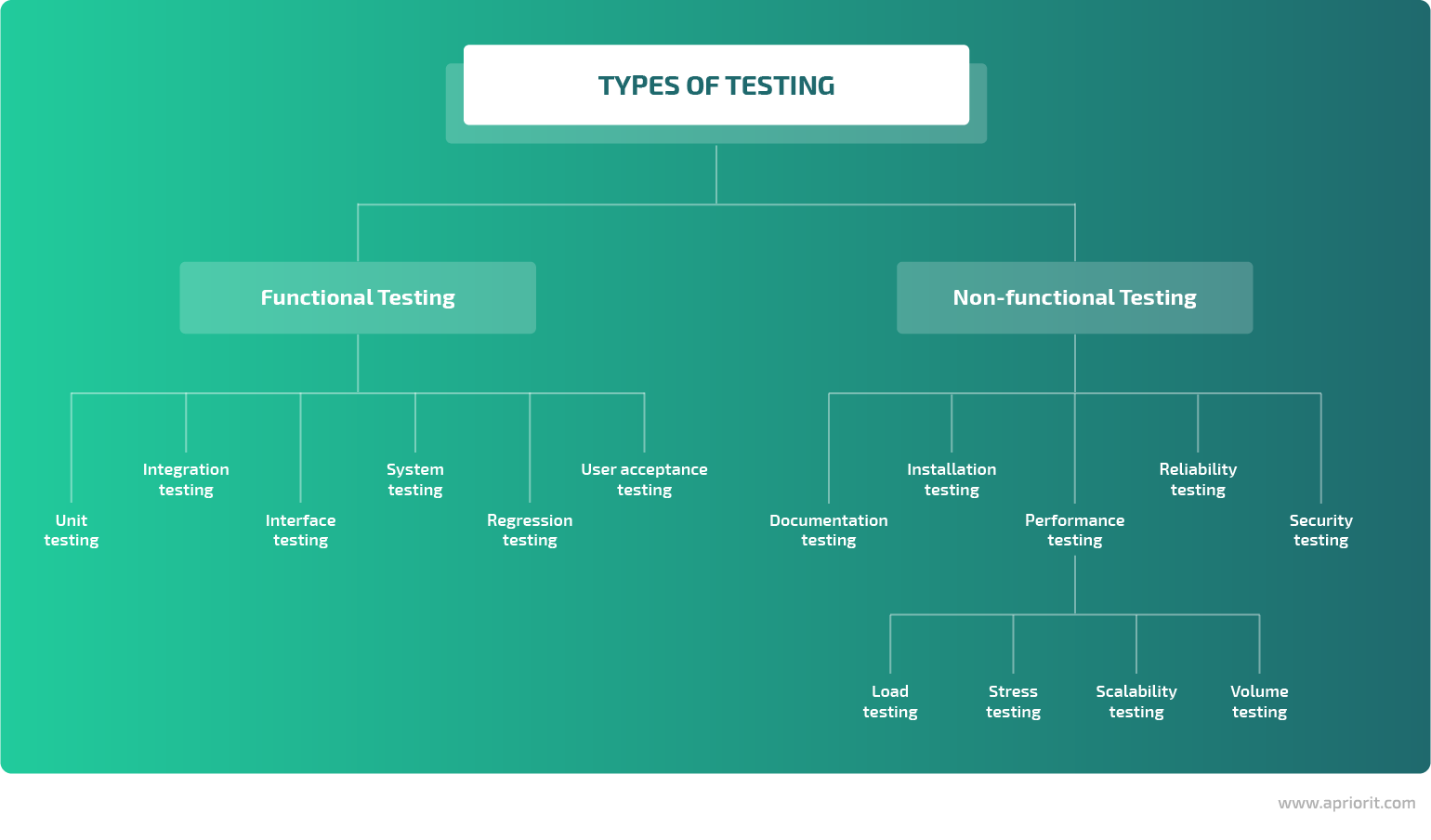
For example, products expecting a significant growth in users should go through thorough load testing. To check if a system remains secure and its performance remains stable even under severe loads, QA professionals need to gather and analyze various metrics like CPU load on the server side, system response time, number of requests per second, and error rate. If a load handling problem is detected, both QA specialists and developers can start looking for a solution to it.
One of our clients, for instance, wanted to improve their product with an artificial intelligence-based snapshot analysis feature. During load testing, we learned that the third-party component this feature relied on could only process about 50% of all received snapshots. We managed to increase the product’s performance by adjusting snapshot analysis algorithms and improving the way the system received snapshots and processed image analysis results.
5. Product stabilization
When the product is almost ready for release, Apriorit’s QA experts continue to cooperate closely with all project stakeholders. At this stage, our goal is to make sure the system is stable and performant, all of the planned functionalities are released, and the result of our work fully matches our client’s expectations.
In particular, we help our clients:
- Run final checks on the product’s performance, stability, reliability, and security
- Validate that the delivered product matches requirements and expectations
- Outline and implement suggestions for possible product improvements
- Prepare for further support and maintenance of the released product
There are several ways our QA professionals can help you get ready for your product’s release and the following support and maintenance.
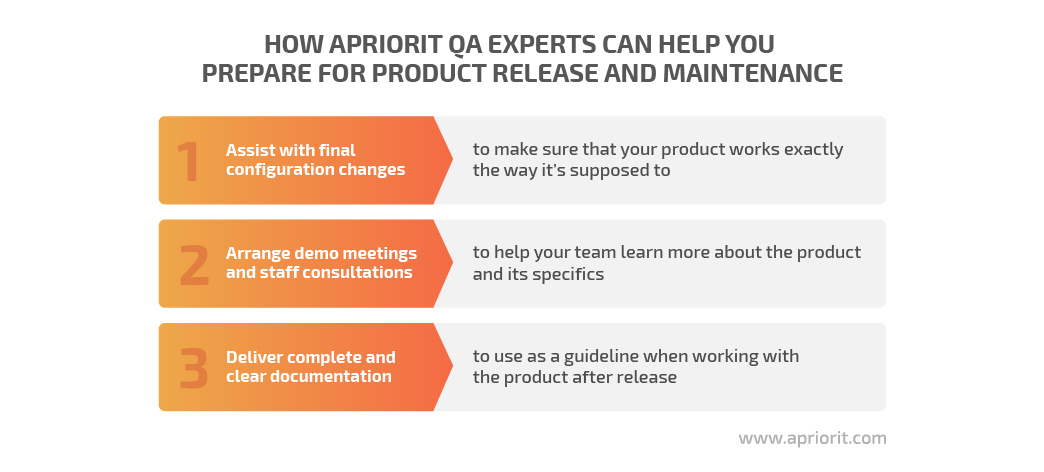
For example, we often help our clients educate their staff on the specifics of a new product or feature. Thanks to detailed instructions and end-to-end usage scenarios prepared by our QAs, the educational process runs smoothly and doesn’t take much time.
6. Product maintenance
Even after the official release of your product, Apriorit QAs can continue monitoring and supporting it. The key is not only to keep your solution performant. Being able to check and validate possible product improvements fast is the key to gaining a competitive advantage and attracting new customers. It’s also important to make sure that any issue that can compromise your product’s stability and security is detected and addressed in a timely manner.
For example, during a regular maintenance check of one of our released projects, our QAs discovered that the application’s server wasn’t responding. Thanks to our timely reaction and effective cooperation with the product’s development team, this issue was detected, located, and fixed just in time. If unaddressed, the issue could have led to the loss of customer trust and finances for our client.
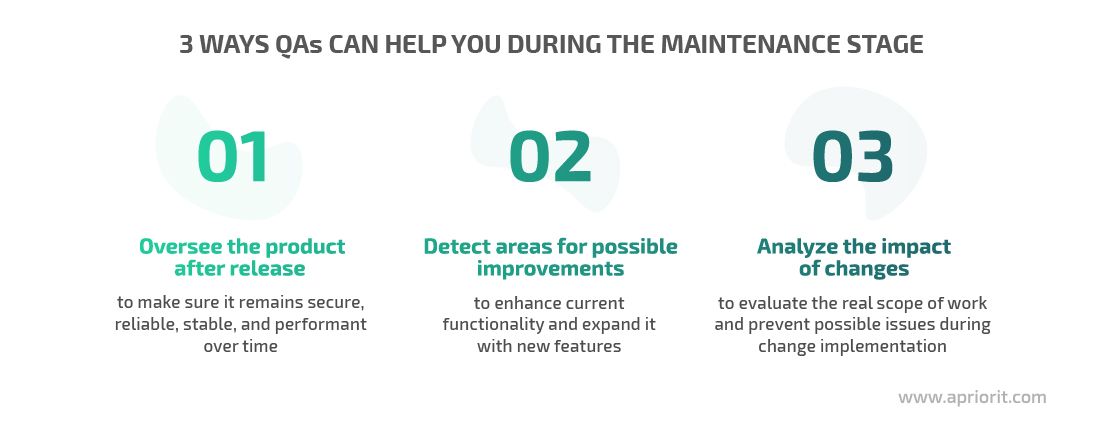
When needed, our QA experts can also help you determine the most efficient path for improving existing features or introducing new functionalities to a released product. In particular, we can assist you with determining areas for possible improvements and analyzing the impact of these changes on your system.
These are the six key stages of software development during which we usually turn to QA experts for assistance. As you can see, deep involvement of QA experts at each of these stages can help you receive a high-quality solution that perfectly matches your requirements and expectations.
Conclusion
Professional quality assurance is the key to building a quality, stable, and secure product that your end users will find comfortable and pleasant to use. While there are different opinions about the necessary level of involvement of quality assurance experts in software development, at Apriorit, we prefer to cooperate with our QA experts at all important stages of this process.
Our team of passionate QA professionals will gladly assist you in delivering a quality and secure product that can help you gain a competitive advantage and the trust of your customers.
Ready to take the first step towards improving the quality of your product? Contact us to start discussing the best QA approach for your project.


